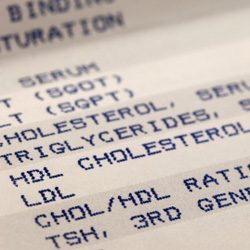 Triglycerides
are the form in which fat moves through the bloodstream to your body's
tissues. Whenever your LDL ("bad") cholesterol is measured,
triglycerides are checked, too. (A triglyceride test is typically
performed in a lipid panel, in which total, HDL and LDL cholesterol are
all measured.) At present, triglyceride levels lower than 150
milligrams per deciliter (mg/dL) are considered normal and levels above
200 mg/dL are considered too high.
Triglycerides
are the form in which fat moves through the bloodstream to your body's
tissues. Whenever your LDL ("bad") cholesterol is measured,
triglycerides are checked, too. (A triglyceride test is typically
performed in a lipid panel, in which total, HDL and LDL cholesterol are
all measured.) At present, triglyceride levels lower than 150
milligrams per deciliter (mg/dL) are considered normal and levels above
200 mg/dL are considered too high.High triglyceride levels can be genetic, but dietary influences are strong, and refined carbohydrates and fruit juices in the diet are the main factor boosting triglyceride levels in the blood. This is especially true for quick-digesting (high glycemic load) carbs. In many people, these foods elevate insulin levels, and insulin affects both triglyceride synthesis and the storage of fat.
The following lifestyle changes are recommended to help keep your serum triglyceride levels down in the
desirable range:
- Get regular exercise.
- Lose weight if you're overweight.
- Cut back on alcohol, avoiding beer especially (even small amounts of alcohol can elevate triglyceride levels).
- Increase your intake of omega-3 fatty acids by eating salmon, sardines, black cod and herring on a regular basis, and consider taking a molecularly distilled fish oil supplement that contains both EPA and DHA in a dose of 2-4 g per day.
- Maintain a diet that's low in processed carbohydrates, such as my anti-inflammatory diet, and familiarize yourself with the concept of glycemic load, which can help you choose carbohydrate foods that rank low on that scale. Source

No comments:
Post a Comment